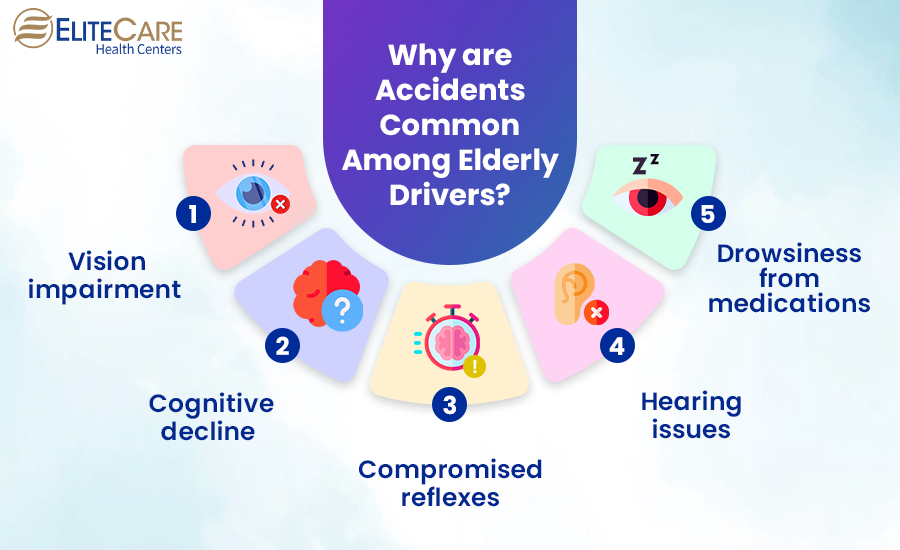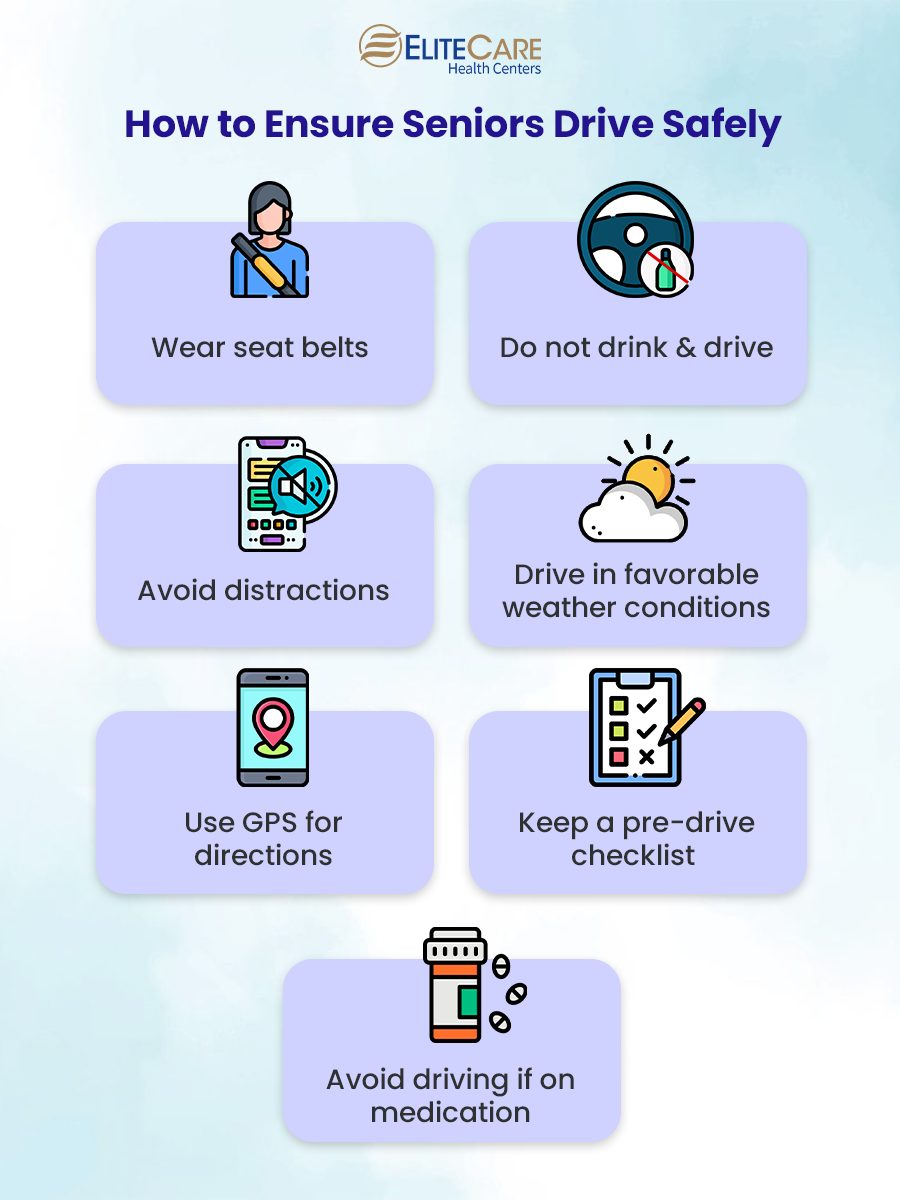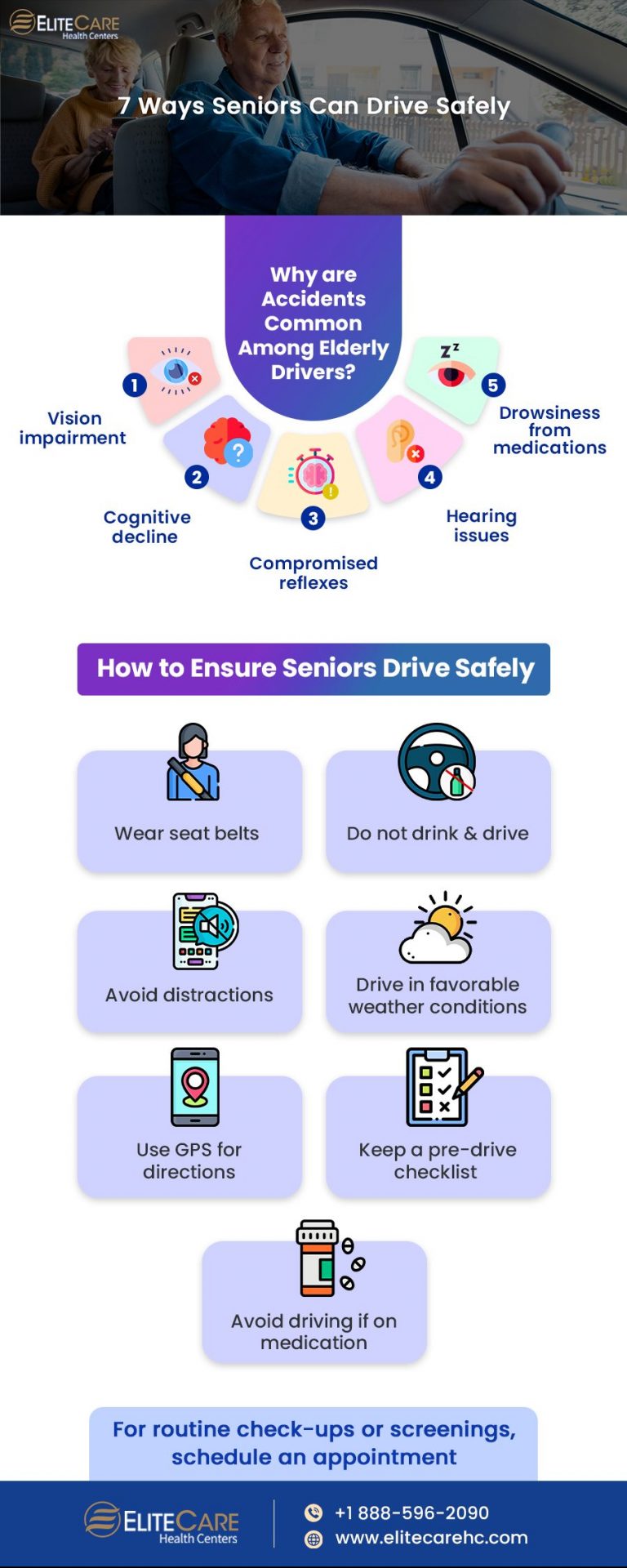
Driving is an important aspect of independence and mobility for many seniors. As we age, our reflexes and driving skills can diminish, making it more difficult to navigate the roads safely. According to the last report published by the Centers for Disease Control and Prevention (CDC) in 2020, about 7,500 people over 65 were killed in crashes, and almost 200,000 received treatment in emergency departments for crash injuries in the United States.
Hence, seniors need to take special steps and follow a few travel safety tips to ensure their own safety and the safety of others while driving. Knowing the risk factors and how to maximize driving safety is essential to avoid unfortunate accidents.
Read More: Factors that impact post-accident recovery
Why are Accidents Common Among Elderly Drivers?

Accidents are common among elderly drivers due to several factors that can impact their ability to drive safely. These factors include:
- Vision impairment: As we age, our eyesight tends to deteriorate, making it more difficult to see objects clearly, especially at night or in low-light conditions. Hence, poor visibility can increase the risk of accidents.
Read More: Why are eye exams vital for seniors?
- Memory concerns: Memory loss and cognitive decline can affect a senior’s ability to remember and follow rules of the road, such as stopping at stop signs or yielding to pedestrians.
- Motor functions: As we age, our physical abilities tend to decline and our reflexes slow down. Therefore, it affects the ability of seniors to react and make spilt second decisions while driving, leading to greater risk of accidents.
- Hearing issues: Hearing loss is common among older adults, making it more difficult to hear important sounds, such as sirens, horns, or other warning signals.
- Medications: Many older adults take medications that can affect their ability to drive safely, such as sedatives, tranquilizers, or other drugs that can cause drowsiness or impair judgment.
Read More: 5 best tips for wound care for seniors
How to Ensure Safe Driving for Seniors

1. Always wear seat belts
Wearing a seat belt is the most effective form of protection in the event of a crash. According to the CDC, seat belts reduce the risk of death by 45%, and reduce the risk of serious injury by 50%. Make sure to remind seniors to fasten their seat belt every time they get in the car, and encourage passengers to do the same.
Read More: Treating neck pain with acupuncture
2. Do not drink and drive
Alcohol accounts for about one-third of all traffic fatalities in the United States. It can affect the ability of the brain to make driving decisions and react to changing situations. It can also make driving more difficult, especially for seniors who may already have slower reaction times due to age-related changes.
Besides, seniors often take multiple medications due to their pre-existing health conditions. Some of these medications can interact with alcohol, potentially causing side effects such as drowsiness or dizziness. If the seniors have plans to drink, designate a sober driver or ask them to use a ride-sharing service.
3. Limit distraction
Limit conversations with passengers and avoid activities like eating, drinking, smoking, and using a cell phone while behind the wheel. If a senior needs to use a cell phone for some urgency, they should pull over to a safe area before making a call or sending a text.
Additionally, adjusting the radio, climate control settings, and other settings should be done before the car is put into drive. Always keep the focus on the road and the surroundings.
4. Drive in favorable weather conditions
Good weather conditions and daylight make it easier for seniors to see the road and potential hazards. Sunny weather, for example, makes it easier to identify pedestrians, animals, and other vehicles. While bad weather, such as rain, snow, or fog, can make driving more challenging and increase the risk of accidents due to poor visibility.
Moreover, pleasant weather and daylight can make the driving experience more pleasant, reducing stress and fatigue. It can help seniors stay alert and focused behind the wheel. Also, in the daytime seniors don’t have to adjust to changing light conditions, such as the glare of headlights and the darkness of the night. If the weather is poor, consider delaying your trip or finding an alternative mode of transportation.
5. Use technology for directions
Using technology for directions can help ensure safe driving for seniors by providing them with accurate directions and real-time traffic updates. With GPS navigation systems, seniors can easily find their destination with turn-by-turn directions. They can also avoid traffic by viewing the latest traffic updates on their device.
In addition, many navigation systems allow for hands-free operation, which can be especially beneficial for seniors who may have limited mobility or vision. With voice-activated commands, seniors can easily access the features of the navigation system without having to take their eyes off the road. Teach them the necessary technological advancements so that they can drive with ease.
6. Keep a pre-drive checklist
Before hitting the road, it is a wise idea to go through a pre-drive checklist to make sure the vehicle is ready for the trip. This can include checking tire pressure, gas tank, fluid levels, and brakes, as well as carrying necessary documents, such as the driver’s license and registration, insurance papers, etc. Also, keep medical documents in the glove compartment handy for any unforeseen emergency medical situation.
7. Know your medication
Some medications can interfere with a senior’s ability to drive by causing dizziness or nausea. Following are some common medications that can cause these side effects.
- Sedatives used in treating anxiety, insomnia, or other conditions, such as benzodiazepines and nonbenzodiazepines
- Antidepressants such as tricyclic antidepressants and selective serotonin reuptake inhibitors (SSRIs)
- Opioids used for relieving pain, such as morphine and oxycodone
- Antipsychotics such as haloperidol and risperidone treat psychosis
- Anti-anxiety medications like buspirone and hydroxyzine
- Anti-seizure medications used for epilepsy, such as phenytoin and valproic acid
- Antihistamines such as diphenhydramine and loratadine that treat allergies
It is essential to ask a healthcare provider about the side effects of these drugs, and how long seniors should wait after taking the medication before attempting to dive, and if there are any other suitable alternatives for seniors who drive regularly.
Summing up
With the help of the above suggestions, seniors can operate their vehicles safely and confidently while minimizing the risk of accidents and staying safe on the road. It is critical to remember to drive with caution, adjust driving habits to accommodate physical limitations, and be aware of other drivers on the road. For regular screenings and check-ups and senior care services schedule an appointment at your nearest EliteCare Health Centers.






